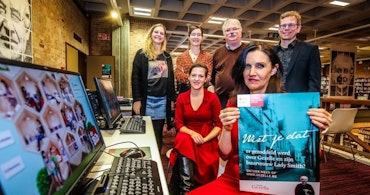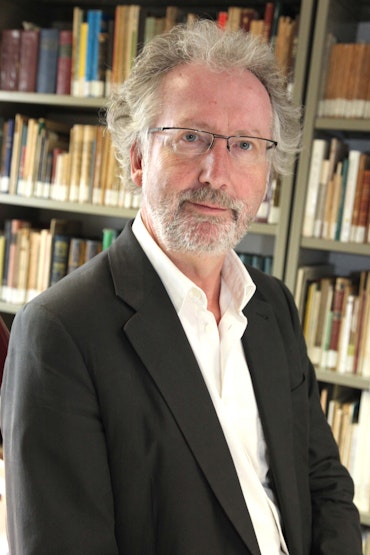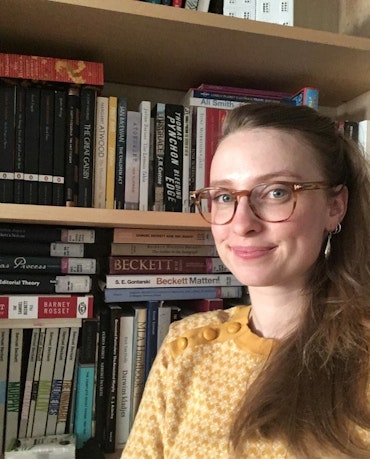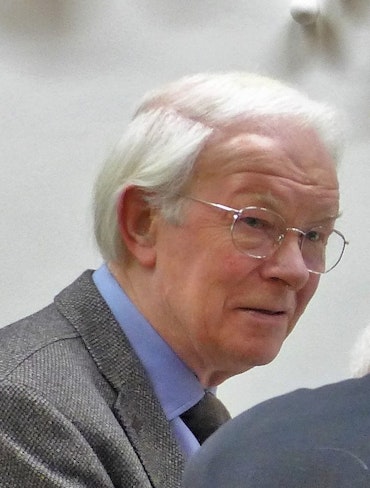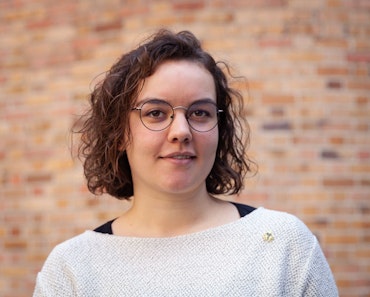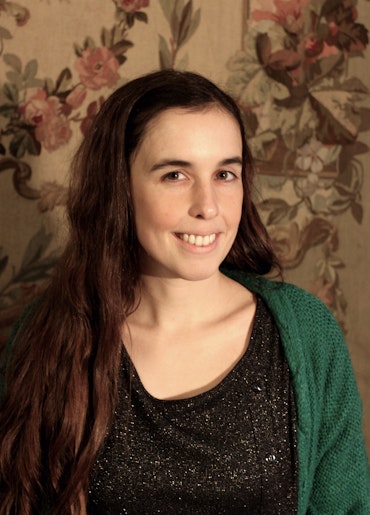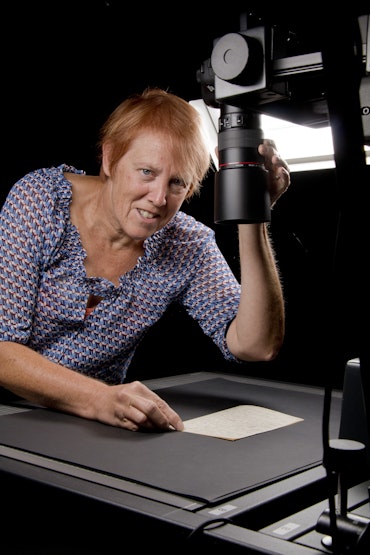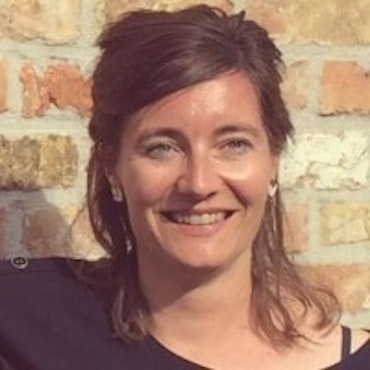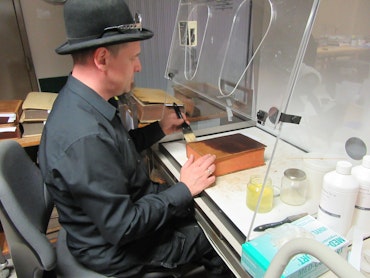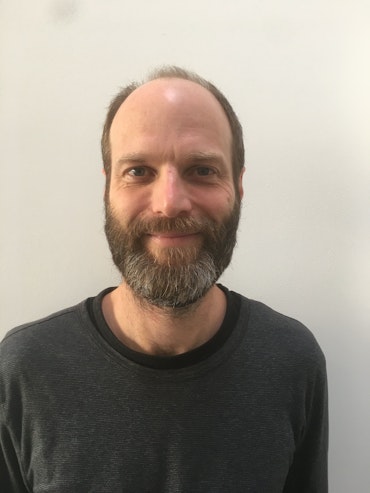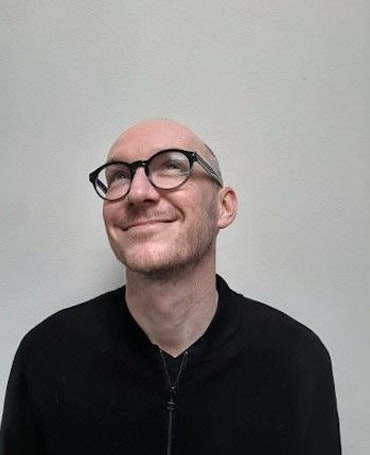
Letter Project Volunteers and Team
Meet the team and volunteers who contributed to the online edition of Gezelle’s correspondence


Bart Vandekerkhove
Bart Vandekerkhove is the driving force behind the project Singing Gezelle. He collects and sings songs based upon lyrics by Gezelle. He is the chairman of the Guido Gezelle Circle and a member of the Guido Gezelle Society. He published various articles in Gezelle magazines. His first book Not far from my door I have a neighbour odd… Gezelle in 170 riddles was published in 2018.
For the letter project College of Saint Louis Bart Vandekerkhove edited the correspondence of Pieter Busschaert and Hendrik Rommel.

“By studying his personal correspondence very closely, I had the opportunity to discover the more intimate side of Guido Gezelle. Nothing is as intimate as one’s personal correspondence. This letter project gave us a unique insight into Gezelle’s universe.”

Modelling a Song
Within my research concerning compositions based upon texts by Guido Gezelle, Pieter Busschaert and Hendrik Rommel constitute an important source of information. Through their correspondence with Gezelle and with composers one witnesses the emergence of a song. It is obvious that a composition, involving a lot of interaction between the poet and the composer, is a combination of cooperation and modelling resulting in a beautiful song..

The Urge to Jot Down
It is striking that Gezelle uses every blank margin of letters, postcards or envelopes to jot down linguistic notes. In general they had nothing to do with the contents of the letter, but they witness to his linguistic creativity and his never-ending urge to jot down.

Seppe De Schepper
Seppe De Schepper studies philosophy at the University of Ghent. As a student he decided to re-read Gezelle in order to get in touch again with his mother tongue. Originating from the Meetjesland he highly appreciates Gezelle’s poetical descriptions of this area’s nature.
For the Royal Academy of Dutch Language and Literature section of the letter project he edited the correspondence of Amaat Joos.

“My interest in Gezelle awoke at the university. Dealing with texts from all over Europe tends to alienate you from your native culture and language. Therefore I decided to re-read Gezelle because I appreciate his linguistic creativity.”

Amaat Joos
The correspondence of Amaat Joos is interesting because this canon wrote theological tracts and gives interesting information from a philosophical point of view on 19th century catholicism. I wanted to know more about the discussion with the Flemish Movement in which Joos and Gezelle were involved, this being a fascinating part of 19th century history.

Dr. Karel Platteau
Karel Platteau has a Germanic philology degree. In 1999 he doctorated at the Catholic University of Brabant (Tilburg) with his thesis entitled Guido Gezelle’s translation of Longfellow’s Song of Hiawatha and its effect on his poetry. Karel Platteau is a member of the Guido Gezelle Society and a co-founder of the Stijn Streuvels Society.
For the project College of Saint Louis, Karel edited the correspondence of Pieter Baes, Jan Craeynest and Franciscus Mervillie.

“One can really consider Gezelle as a “coat rack” for the 19th century, albeit one with a large hat shelf, an umbrella holder and many hooks. And even with a few barbs. After all, his work and his correspondence contain so many “hooks” towards culture, politics, religion, language, etc. Often in contradiction with the standards of his time, but ever so often inextricably linked with them, like the sting of a honey bee.”

Creation of a “Linguistic Product”
The young priest Craeynest, a distant relative of mine, was allowed to study philology in Louvain. He dreamed of becoming a doctor of comparative linguistics, but this plan was rejected. He became the ideal “assistent” of the elderly and sickly Gezelle in translating the bone-dry, soulless Meditationes. Together they started searching through Middle Dutch sources and “enjoyed” themselves creating a “linguistic product”.

Act like a Boss
When your family name is “Baes” (Boss) you can just as well act bossy. And that is what Pieter did. He could press Gezelle to deliver poems quicker, and having received them even promptly, he still dared to answer : “You have written nicer ones!”

Dr. Jan Geens
Jan Geens obtained his doctorate in Philosophy and Literature at the Catholic University of Louvain in 1982 with a thesis: Guido Gezelle’s journalistic activities in the political weekly paper ‘t Jaer 30. He was a language teacher at various colleges and graduate schools and held director’s positions at several high schools and in the Flemish Graduate School Council. Jan Geens is the chairman of the Guido Gezelle Society and is actively involved in various cultural associations.
For the letter project College of Saint Louis he edited the correspondence of Hendrik De Badts.

“From the letters of De Badts appear the Flemish clergy’s esteem of Gezelle as a young publicist, and their willingness in providing him with information for Rond den Heerd from all over West-Flanders, and perhaps even more for the political weekly paper ‘t Jaer 30. Considering how Gezelle used this in his journalistic work, it is ascertained how flexibly and subtly he incorporated the supplied information into interesting journalistic texts.”

A Remarkable Correspondent
To me, H.A. De Badts was a remarkable correspondent because he had access to Gezelle’s closest relatives, ànd was an anonymous but important contributor to Gezelle’s Brugean magazines, and also to the political weekly paper ‘t Jaer 30. He was a well read person with a vision beyond boundaries and inspired Gezelle to write articles in Rond den Heerd (By the Fireside), among other things.

A Bit of Pressure
On 25 May, 1868 he ironically reminds Guido Gezelle of his promise : “I’m waiting with ever more patience for the Flemish Vegilla and Stabat, which you promised to send me “soon”, the other day when I came to see you. Soon hasn’t come yet. I wished soon would come soon. The sooner, the better”.

Paul Thoen
Paul Thoen is a classicist and was a teacher at the minor seminar in Roeselare for 36 years. In national and international specialist journals and compilations he published various contributions on rhetoric, literature history and literature education.
For the letter project College of Saint Louis Paul Thoen edited the correspondence of Felix De Grendele, Isidoor Hemeryck and Victor Van Coillie.

“Gezelle was said to be timid, reluctant and not very “social”. At the same time he had these intense contacts with so many people. Further exploring this Gezelle secret, which is also hidden in his occasional poems, attracted me to participating in this letter project.”

Friendly Contacts
I chose correspondents who met Gezelle as students at the minor seminar and continued contacting him by means of letters. His relationship with Victor Van Coillie turns out to be almost comradely, evolving into a literary cooperation, particularly for the magazine Rond den Heerd (By the Fireside). In 1988 Gezelle wrote the poem for his funeral card Hij, dichterlijk begaafd (He, poetically gifted).

The Anonymous Poet
Gezelle most quickly delivered the memorial card requested by Isidoor Hemeryck for the jubilee of the Holy Mary congregation on December 8th, 1863. However, Gezelle wanted to be anonymous, so Hemeryck passes for the writer of Als Pius spreekt (When Pius speaks). He writes to Gezelle : “Certainly I should thank you in the name of the congregation members and of the board members in particular, but no one knows who is the author of these verses, … In the rhetoric class, word has it that Hemeryck has become a poet, …

Stefaan Maes
Germanic philology graduate Stefaan Maes worked as a teacher and translator of Dutch and German. He is a visitor guide in the “Lijsternest” (Gezelle’s cousin and author Stijn Streuvels’s house in Ingooigem, West-Flanders) and a member of various cultural associations, such as the Stijn Streuvels Society, the Gezelle Society and the Gezelle Circle.
For the letter project College of Saint Louis he edited the correspondence of Pieter Baes, Pieter Benoit and Hugo Verriest.

“Gezelle turns out to be a rather complicated person showing quite a few contradictory characteristics. Sometimes he is a man of principles, sometimes he is lenient, sometimes sarcastic, sometimes sympathetic, sometimes militant, sometimes downcast…”

Hugo Verriest
Verriest was the one who surprised me the most. His adoration of Gezelle is unparalleled, even though he didn’t always agree with him. Also the human connection between these two is unique. Top class.

Inge Geysen
Inge Geysen is an assistant curator at Musea Brugge and as such responsible for the Guido Gezelle House, the birthplace of the poet that you can visit in Bruges.
For the letter project College of Saint Louis she studied the correspondence of August De Geetere, Leonardus Vandemaele, Cyriel Vanden Berghe, Louis Van Heule and Edward Verraes. For the project The Royal Academy of Dutch Language and Literature she is working on the correspondence of James Weale.

“Letters are fine sources to work with. They bring you into close contact right away with your research subject by means of the handwriting, the way of communicating, and the contents. I admit : I have always had a soft spot for letters. In the pre-email era I liked to write them myself.”

James Weale
When you get into 19th century Bruges, James Weale will inevitably cross your path. He did research on the Flemish Primitives, co-founded the Archaeological Society of Bruges (which evolved into the Gruuthuse museum), cooperated with Guido Gezelle, had an elaborate network at home and abroad… I’m curious to know what these gentlemen had to discuss.

Johan Van Eenoo
Johan Van Eenoo graduated as a translator-interpreter and is a staff member of the Public Library of Bruges. He is a board member of the Flemish Esperanto-Union and Cultuurplatform Speling, musical leader of the Brugean dulcimer group “In de klaere maene”, and folk song collector.
For the letter project College of Saint Louis he edited the correspondence of Leonard De Bo, Edmond Houtave, Aloïs Vandemaele en Bruno Vander Stichele.

“I choose De Bo as a correspondent out of admiration for his West-Vlaamsch Idioticon (West-Flemish lexicon), in which the spelling of many words matches the orthographic system that I have developed for the West-Flemish dialect”

Forgiveness and Kiss of Peace
Gezelle and De Bo had a fine relationship. This doesn’t mean that there wasn’t a fly in the ointment from time to time. A tip of the veil is lifted by a small poem in a letter by De Bo asking Gezelle for “pardoen” (forgiveness) and “den vredezoen” (the kiss of peace).

English Lads
From Aloïs Vandemaele comes the idea to get “Engelschmannekes” (English lads) to the college in Tielt, where he was a teacher of English. The purpose was to provide more opportunity for his students to practise English conversation. After secondary school the college would send the lads on to the English seminary in Bruges, from where they would be deployed as Roman Catholic priests in England. Vandemaele turned to his earlier school friend and teacher Gezelle because of the latter’s contacts with English families.

Koen Calis
Koen Calis is director-librarian of the Public Library Bruges. He published several articles on 19th century literature and is the author of the blog Brugse Verzen (Brugean Verses).
For the letter project of Saint Louis he edited the letters of Pieter Baelden, Alfons Dassonville, Cyriel Delaere, Alfons De Leyn, Isidoor Fraeys, Victor Goethals, Julius Leroy, Emiel Minne and Ferdinand Van den Putte.

“I consider it important that letters are not only inventoried, but that their contents are made available as well. This would be impossible without volunteers. As to me, it makes sense to spend my leisure time on a high-level cultural project. It gives you intellectual stimulation and you make a contribution to the community.”

Intellectual Elite
I was surprised by the coherence of the corpus. A network is formed by common threads running all through the letters and correspondents. The College of Saint Louis involved a kind of intellectual elite in the wake of the tandem Gezelle - De Bo.

Birgit Ampe
Birgit Ampe is a scientific staff member and the conservation specialist of the Public Library of Bruges.
For the letter project of the Royal Academy of Dutch Language and Literature, Birgit edited the correspondence of Jan Broeckaert, Joannes Willem Brouwers, Hippoliet Haerynck and Constant Jacob Hansen.

“I knew that Gezelle enjoyed much prestige in his days and that many people asked him for linguistic advice. However, I didn’t know how closely he was involved in the Royal Academy for Dutch Linguistics and Literature. It was surprising to read that some of my correspondents requested his specific support in order to be appointed as member of the Royal Academy for Dutch Linguistics and Literature.”

Joannes Wilhelmus Brouwers
Joannes Wilhelmus Brouwers’s letters are interesting because they are dealing with the tensions between catholics and protestants. There were polemicists on either side of the border and Brouwers obviously considered Gezelle the leader of the catholic movement.

Els Depuydt
Els Depuydt is a scientific staff member of the Public Library Bruges and responsible for the Guido Gezelle Archives. She is a member of the Gezelle Society. Her thesis as a Germanic Philology student on the letters from missionaries to Gezelle awoke her interest in the poet. She was a scientific collaborator in a research project on Gezelleletters at the University of Antwerp. Within the current correspondence project she can combine her three passions : languages, literature and history.
Els is the correspondence project coordinator and edited the letters of a number of correspondents including Edward Van Robays, Bruno Van Hove, Desiderius Meersseman, etc.

“Every handwriting has its own complexity and some letters are real brain-teasers. Beside that, puzzling out the letter fragments and reassembling letters by their water mark, contents, ink, paper and handwriting is an intellectual challenge”

Humour, Guts and Charisma
Edward Van Robays is a charismatic correspondent with a sharp pen, some humour and the guts to rebuke Gezelle from time to time. As a teacher of mathematics he was involved in translating mathematical terminology into Flemish, and publishing about this in Rond den Heerd (By the Fireside). He also was a co-founder of the magazine Biekorf (Beehive).

Punchy and Picturesque Language
Van Robays’s letters are pleasant to read. He uses a punchy and picturesque language, e.g. in his letter of May 12th, 1888 in which he exhorts Gezelle to action : “So, you will do it, won’t you? For once, do put aside all this silly and stupid shame or fear to ask a small wedge of the cake that has always disappeared entirely into the muzzle of those greedy and undeserving infidels untill now”.

Sofie Leyts
Sofie Leyts studied Germanic philology. She is a youth author and staff member of the Bruges Public Library. Due to the corona crisis, Sofie had to work from home and became involved in the preparatory editorial work of the letter project. So she had to read the letters of all kinds of correspondents, including Eugeen Van Oye one of Gezelle's students. For the letter project of the Royal Academy of Dutch Language and Literature, Sofie edited the letters of Désiré Claes and Alexandre Bonvarlet

“Reading the letters you get to up close and personal with Gezelle. Not through intimate outpourings but in the way he answered letters of his correspondents and his consideration towards them. The letters also reveal the versatility of his oeuvre. My admiration for the man has only grown. He was a talented word artist and a fine craftsman in evoking nature in wonderful sentences.”

Eugeen Van Oye
The amount of letters exchanged between teacher and student is enormous. Eugeen's unlimited dedication for Guido Gezelle came close to real devotion. It was fascinating to see him evolve from a fiery, sometimes grumpy young man (who sometimes really annoyed me) into an adult man. It gave a good glimpse of the life back then. I got to know Guido Gezelle a lot better through his reactions to Eugeen's letters: always patient, engaging, wise.

Lut De Neve
Lut De Neve studied Cultural Studies and has been working in the Ghent University Library since 2005. For the letter project of the Royal Academy of Dutch Language and Literature, she edited the correspondence of Ferdinand Vander Haeghen.

“Vander Haeghen’s "Flying Papers" constitute an important part of the special collections kept at Ghent University Library. The correspondence of Gezelle is an impulse for me to delve further into the visionary Vander Haeghen, a collector with an eye on the future.”

Ferdinand Vander Haeghen
Ferdinand Vander Haeghen was the chief librarian of the Ghent University Library from 1869 to 1911. His letters are kept in the Guido Gezelle Archives. Gezelle's letters to Vander Haeghen are preserved in the Ghent University Library. It is not difficult to guess the main topic of the letters: books, books and books again!

Prof. Rik Van Gorp
Rik Van Gorp is professor emeritus of Literary Studies and former dean of the Faculty of Arts of the Catholic University of Leuven. For several times he was a docent at foreign universities as Belgian visiting professor, e.g. the University of London and the University of Pennsylvania. He was a member of the jury of the AKO Literature Prize and the Libris Literature Prize and he was the chairman of the Arts Committee of the Ministry of Culture and of the Council of Experts of the Flemish Literature Fund. For the letter project of the Royal Academy of Dutch Language and Literature, he edited the letters of Pieter Willems, Josephus Albertus Alberdingk Thijm, Peter Paul Alberdingk Thijm and Servaas Daems.

“What did I learn about Gezelle? That he tried to promote his own work (and that of some of his students) by means of his correspondence (in Thijm's Almanac and the magazine Dietsche Warande, among others); and that he was looking for money for his English Seminary. Moreover, that he was rather sloppy in writing letters and that he often jumped from one subject to another ...”

Jozef Albert Alberdingk-Thijm
Jozef Albert Alberdingk-Thijm was a Catholic leader in the Netherlands, who was in favour of cooporation between the Flemish and the Dutch, despite religious tension. On February 23, 1858, he wrote to Gezelle: “It would be deplorable, if the idea grew, that by promoting Frenchism among the Flemish and the Brabant people, one could counter Protestantism. One should realize that this does not mean closing the door for Freemasonry… ” (a letter on the resistance of a number of Flemish Catholics who were afraid of coming across as Dutchmen (meaning Protestants) and therefore prefered to play the French-mindedness card).

Prof. dr. Piet Couttenier
Piet Couttenier is emeritus professor of Dutch literature at the University of Antwerp and the Catholic University of Leuven. Until 2011 he was responsible for the Center for Social Studies and the Institute for the Study of Literature in the Low Countries of the Antwerp University. From 1989 to 2011 he was editor-in-chief of the magazine Gezelliana. Chronicle of the Gezelle Study. He is a member of the core team and for the letter project of the Royal Academy of Dutch Language and Literature he edited the letters of Baron J.B. Bethune.

“Today's participation project is gradually realizing an old dream: making the extensive correspondence of Gezelle accessible, with text and explanation, a rich source for researchers and interested parties everywhere. The Gezelle website works ideally as a gateway.”

Jan Bruggeman
Baron Jean-Baptiste-Emmanuel-Felix-Vincent-Pierre-Marie (de) Béthune was interested in history and art, which is also visable in the correspondence with Gezelle. He sometimes signed his letters with Jan Bruggeman, a pseudonym under which he also wrote in Gezelles magazine By the Fireside.
The Team Behind the Letter Project
The online edition of Gezelle's letters is a participation project of the Bruges Public Library, the Guido Gezelle Society, the Royal Academy for Dutch Linguistics and Literature and the University of Antwerp:
Bruges Public Library
- Els Depuydt, responsible for Guido Gezelle Archives (also volunteer)
Project management, guidance of the volunteers and editor - Katrien Deroo, expert digital development and innovation
Technical guidance and support, development of letter platform commonly used by the volunteers - Koen Calis, director-librarian (also volunteer)
General project development - Johan Van Eenoo, editor (also volunteer)
- Heidi Keereman, digitization
- Andy Feys, digitization
- An Desmedt, communication
Guido Gezelle Society
- Jan Geens, Chairman of the Guido Gezelle Society (also volunteer)
General project development
Royal Academy of Dutch Language and Literature
- Judith Van Doorselaer, ad interim director
General project support - Ellen Vanderstraeten, researcher
Technical guidance and project support - Bert Van Raemdonck, director
General project development (-2020) - Ron Van den Branden, senior researcher
Training volunteers , technical guidance and project support, development of the online edition (-2020)
University of Antwerp
- Prof. Piet Couttenier (also volunteer)
Supervisor Letter project within UA: inventory, reconstructions of letters and first transcripts
Team: Boudewijn De Leeuw, Els Depuydt, An Labis, An De Vos and Lisette Baeten
For the edition of the letters, we also counted on the help of a wide circle of Gezellians, who made valuable contributions to the transcription and explanation of words by way of the 'Free to ask pigeonhole'.
